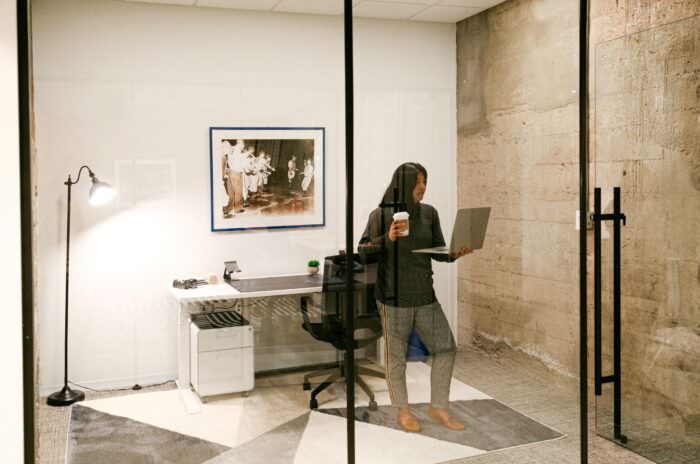The glass ceiling, the wage gap, harassment – most of us are well-versed in all that can ail women in the workplace. But what about when women strike out on their own to start a business, how do they fare? Are there gaps between how men and women succeed as entrepreneurs, and, if so, why is this noteworthy and how can it be remedied?
From a bird’s eye view, things are looking great for female entrepreneurialism as women are starting businesses at a tremendous rate. According to the American Express’ 2019 State of Women-Owned Business Report, between 2014 and 2019 the number of women-owned businesses in the United States climbed 21% to a total of nearly 13 million, employing 9.4 million workers and generating $1.9 trillion in revenue. Currently, women-owned businesses represent 42% of all businesses, which is jaw-dropping when compared to 1972’s paltry 4.6%. Perhaps it’s obvious as to how women starting businesses is a huge boon to the economy but for concrete proof, during the afore-cited 2014-2019 period, total employment by women-owned businesses rose 8%, while for all businesses the increase was just 1.8%.
So, is that it? Do we simply need to post signs saying, Start a business, sister, on lampposts everywhere? If only. Unfortunately, women-owned businesses lag far behind those run by men in terms of revenue generated, and, typically, are much slower to receive funding from lenders or venture capital firms. Moreover, many of these women-owned businesses are often side-hustles, with many women doing things like driving an Uber after their 9-to-5 ends out of necessity. The American Express report describes necessity entrepreneurs as those women unable to find quality employment or are earning less than they should, so they start their own business, and flexibility entrepreneurs as those women who start businesses because their employer doesn’t accommodate their caregiving responsibilities. And while some necessity and flexibility entrepreneurs go on to have flourishing businesses, the majority return to the labor force when they can.
How, then, should women (and men) view female entrepreneurship, as not merely a means for survival but rather as a way to thrive? Marilu Mayorga, the Founder of eStrategy.tech, a small-business consulting firm in Washington, DC, says this generation of women needs to consider starting their own businesses because they are naturally fit for the job: “Women are the CEO’s of their families, keeping everyone going, and we’re natural communicators.” And, yet, Mayorga says many women “never consider the idea of being a boss and the economy is suffering because women aren’t starting businesses.” She says that when women strike out on their own, both business and communities benefit: “We’re mothers so we nurture a business, we nurture a community and women understand the importance of social entrepreneurship and have a greater sensitivity to that need,” meaning that women are less likely to put a lust for profit above consumer and community needs.
In order to shift how women view themselves as business leaders and business owners, Mayorga recommends speaking to girls as early as middle school and addressing the changing pace of life in the digital age: “Social media is making people sick, literally. Instead of competition we need collaboration. Right now [on social media] the prettiest one wins.”
Mayorga is one of many female entrepreneurs who has seen her business thrive while having office space in a coworking center. “Coworking is a natural community and women love sharing ideas.” She says that in order to make coworking even more appealing and better support female entrepreneurs, coworking companies should consider giving discounts to women-owned businesses as well as offer periodic business consultations, and, consider providing daycare, such as the London coworking company, Third Door, does.
Frédérique Irwin is the Founder and CEO of HerCorner, a business accelerator for women, which regularly holds workshops and networking events at Carr Workplaces. Irwin says, “women feel much more comfortable [discussing business] when around other women,” explaining that “when you add men to the mix, posturing goes up.” She explains that while it’s much harder for women to get funding for their businesses, with an average of only 4% of venture capital funding going to women-owned businesses, she chooses to focus on “how we can help women businesses catch-up,” by providing strong business fundamentals.
In terms of how coworking centers or really anyone can help women-owned businesses, Irwin says we need to begin directly offering help because women are far more likely to assume an overwhelming burden of responsibility. “There’s the five-word kiss of death, ‘I’ll just do it myself.’ It’s a systemic behavior,” Irwin says. Like Mayorga, Irwin lauds the benefits for women entrepreneurs that coworking spaces provide saying, “there’s a lot of different companies and brains.” She advises female entrepreneurs in coworking centers to “make sure they are sharing what they are working on with everyone else because that’s how relationships bloom.” Irwin says that women are natural at supporting each other and, more specifically, with connecting each other to people who can help, so it’s key to “let everyone know, ‘this is what I’m working on.’”
Are you a female entrepreneur or woman who is looking to start your own business? Perhaps coworking can help; here are things to consider:
- If you’ve never experienced coworking, find a coworking center that will gift you a complimentary week, and see which coworking center has the right mix of community and quiet to foster productivity.
- Inquire how often a given coworking center has networking events and if they have any women-centric networking events or business workshops.
- Find mentors: see what clients are at a given coworking center, and if any are women-run businesses.
- When negotiating your lease, mention the pink tax, and how women spend more on safety and, as a female entrepreneur, if you can have a discount on your lease.
- Once you’re at the coworking center – talk to people. Get to know your neighbors, women and men alike, and share what you are working on.


